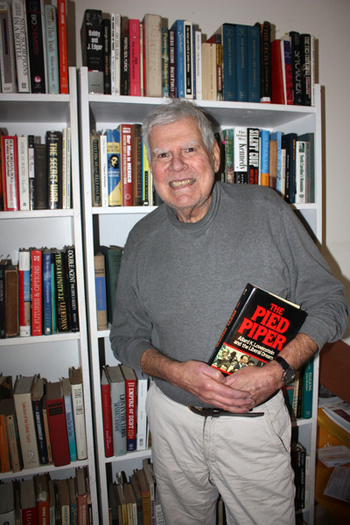
It was on Hamptons tennis courts where writer Richard Cummings cemented lasting friendships with wealthy East Enders that eventually led to the publishing of his first book, “The Pied Piper.”
The book—which documented former liberal civil rights and antiwar New York State Congressman Allard Kenneth Lowenstein, his assassination in 1980 and his work with the Central Intelligence Agency—was largely the product of donations from Barney Rosset, who owned a home in East Hampton, according to Mr. Cummings. Mr. Rosset is the publisher of the Grove Press, which produced “The Pied Piper.”
“If it hadn’t been for the Hamptons, I never would’ve written that book,” Mr. Cummings said during an interview at his home in Sag Harbor.
Life for Mr. Cummings has somewhat come full circle. The inspiration of the Hamptons, and more than three decades of living out east, have been channeled, at least in some part, into a new book, “Prayers of an Ibo Rabbi,” which will be published sometime later this year.
The writer has an extensive resume, with experience advising, lecturing, writing and reporting about international politics, as well as advising political officials and lecturing about law. He has also left his mark on the East End: he was one of the founders of the Group for the South Fork, a local environmental organization that is now known as the Group for the East End; he has been a visiting professor at Southampton College of Long Island University; he was the director of Natural Resources for the Town of East Hampton and he has also served on the Southampton Town Democratic Committee.
Mr. Cummings grew up in Brooklyn and was a standout student at Midwood High School. He then attended Princeton University, graduated with honors, and went on to receive a juris doctorate in law at the Columbia Law School. He said that he pursued law because his parents urged him to do so. At the same time, though, he said he always had dreams of working at the magazine The Economist.
He knew for sure that he wanted to pursue writing after he lived in Ethiopia from 1967 to 1969, where he was asked to teach at newly formed law schools. It was there, he described, that the calling struck him. He said that after visiting Ethiopia, he had felt the need to “expose the hypocrisy of American foreign policy and cultural imperialism” through writing.
“It was in Ethiopia that it came to me that I had to be a writer,” Mr. Cummings said, sitting on a chair next to a large, colorful bookcase in the Sag Harbor home he shares with his wife, Mary. “I didn’t choose it. It chose me.”
America is haunted by the ghosts of its past, he said. He continued that the country is still battling its difficult history with the Civil Rights era and slavery. The writer’s latest book, which does not have a publication date as of yet, speaks to that theme.
The main character in “Prayers of an Ibo Rabbi,” Roger Westerfield, lives in Bridgehampton. In the book, Mr. Westerfield wants to write a novel (Mr. Cummings once lived in Bridgehampton). He meets an agent at a ritzy Montauk party, and his wife, who owns an antiques shop, finds him a condo on St. Simons Island—off the southeast coast of Georgia—where he can go off to begin writing.
St. Simons Island has a spooky legend, referred to as “Ibo Landing,” according to Mr. Cummings. As he tells it, during the era of slavery, a revolt on a slave ship near the island took place, in which 13 slaves, Nigerians from the Igbo tribe, tried to overthrow their white captors. The Igbo people have since changed the spelling of their name to Ibo, Mr. Cummings said.
The rebellion did not sway in the slaves’ favor. And when the tribesmen realized that, they drowned themselves in protest, chanting “The water brought us, the water will take us home.” According to legend, sounds of their haunting wails are still heard on St. Simons Island.
In African legend, as Mr. Cummings explained, for the souls to be free to fly back, unchained, to Africa, they had to claim the life of a descendant of their owner. After much research, Mr. Cummings found out that the name of that person is Thomas Spalding. In the book, Mr. Westerfield learns that he is a descendent of Mr. Spalding.
Mr. Cummings declined to divulge more about the book, not wanting to give away the story. He noted it has gotten praise from noted Nigerian novelist and professor, Chinua Achebe.
“Richard Cummings has written a remarkable story of how the unaccounted events of American slavery are at the root of racialism; and how they continue to haunt American life today. It brings to life one of the most haunting stories of the slave era, Ibo Landing, and shows the tragic connections that have been forged between peoples across centuries and continents,” said Mr. Achebe in a review of an advance copy of the book.
And in true keeping with the circle of his life, Mr. Cummings is considered to be the real deal by his fellow East End writers as well.
Karl Grossman, a journalism educator, author and award-winning journalist, who writes a newspaper column for The Southampton Press, is a personal friend of Mr. Cummings. Mr. Grossman described his friend and fellow writer as one of the handful of geniuses he has met throughout his life.
“He’s a visionary person,” Mr. Grossman said. “He’s very prescient, is the word. He sees things before other people see them. And he also is not a person who can be pigeonholed into some political box. He doesn’t think that way. He doesn’t act that way.”